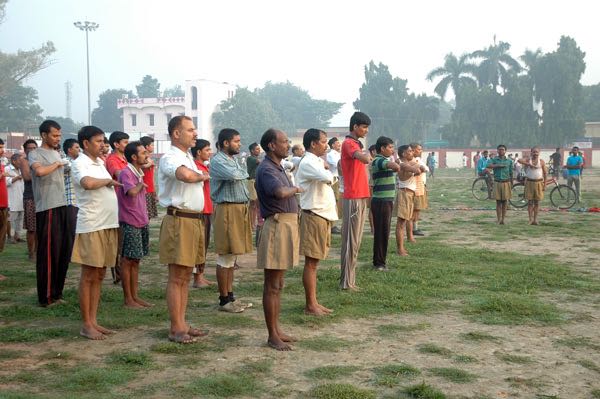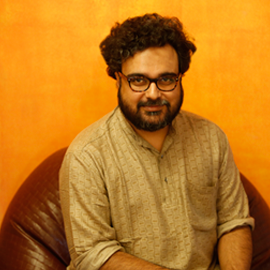Battle for Bihar: how the RSS is helping the BJP fight the election

What is it doing
- The RSS cadre is fanning out across the state to drum up support
Why is it crucial
- The RSS is deeply rooted; its assessment is often better than surveys
- The cadre is extremely committed to the cause
More in the story
- Catch gives you a peek into a sakha in Begusarai
- What does the RSS gain from the kind of support it provides to the BJP?
It is 5:30 in the morning and the sun is not out yet. As a misty Begusarai wakes up, some 60 men gather at the Gandhi Stadium in the heart of the city.
Not all men actually: the youngest of the lot must be an eight-year-old boy. The oldest, on the other hand, is an octogenarian. They are swayamsevaks (volunteers) of the Rashtriya Swayamsevak Sangh (RSS).
Every morning they gather at the ground to attend an hour-long shakha. The assembly kicks off with a yoga session. Those fit enough then play some sports. This is followed by a group song and finally, the prayer with the typical salute - arm folded at the elbow, palm facing downwards near one's chest.
The routine is followed by thousands of such congregations across the country every morning. In Begusarai district itself, there are 63 shakhas, 20 of them focused on the youth.
The ground within the red-and-yellow compound wall is a little wet, muddy even, from a drizzle the night before. But that doesn't dampen the enthusiasm of the swayamsevaks, most of whom have turned out in the white-shirt-khaki-shorts uniform.

Photo: Catch News
This morning, they have some senior functionaries among them, including Begusarai Vibhag sanghchalak, Amrendra Sinha and Manoj, zila kaeyavaah (district in-charge).
After the one-hour session draws to a close, a team of karyakartas (functionaries) start discussing the plan for the day as people from different walks of life pass by, including about a dozen doctors who walk by, greeting them with namaskars.
Soon, after breakfast, many of them would fan out to various places to carry out the tasks assigned to them for the Bihar elections. The district has seven Assembly constituencies, all of which will go to polls in the first phase on 12 October.
As much as it presents itself as a cultural organisation, come elections and the RSS rolls out its cadre to boost the chances of the Bharatiya Janata Party (BJP).
This time the BJP has a close fight with the Grand Alliance of Nitish Kumar and Lalu Prasad. The saffron party's partners in the National Democratic Alliance are mostly busy with their seats. Yes, Union ministers and senior BJP leaders are already in the state to campaign. Still, the RSS cadre is known for putting the most committed effort.
This is why the RSS is integral to BJP's campaign plans. The Sangh's roots run deep among locals. The cadre is trustworthy, sincere and have their own influence and connections. The feedback from the members is considered more authentic than political surveys.
For the RSS, Begusarai is a vibhag area, including other districts like Khagadia and Samastipur and has more than 20 Assembly seats. BJP is neck and neck with the Grand Alliance in most of the seats.
The RSS is rooted and its reading of the poll scene can often beat the best of surveys
The importance of this first phase is not lost on either side: Starting on a good note here can help build a favourable wave for the remaining four phases. No one wants to take a chance. Which makes the RSS all the more important in BJP's scheme of things.
"Our organisation is a cultural organisation. We are not doing any politics here," says Sinha. The in-charge of the Begusarai vibhag looks to be in his mid-50s. "We meet people to ensure they vote. We want them to turn out in large numbers. We will mobilise people to come out of their homes and vote," he adds.
He and Ram Kumar, prant pracharak for North Bihar - one of the two prants (zones) in the state - for the RSS in the state will head towards Bhagalpur to take stock. The other senior functionaries are also entrusted with their Assembly areas.
Back to the basics
Dropping the guard is out of question: Infighting in the party over ticket distribution has become a big concern on many seats. "If a long-time RSS-BJP man is not happy with the ticket distribution, only the RSS can open a dialogue with them and bring them back on the boat," says a senior leader in his 50s.
The roles are etched out well:
1. Identify and address key issues in the campaign and image building, seat by seat
2. Connect with old as new people associated with the RSS or its sister organisations. And activate them
3. Identify areas where the BJP is weak - be it areas or communities - and make strategies accordingly
4. Ensure a strong turn out on polling day in favourable areas
5. Relay feedback from the ground for the 'close to reality' assessment.
6. Meet and convince disappointed leaders, community leaders, those left out and the candidate list and convince them to stand for the cause and party.
In the first week of September, Prime Minister Narendra Modi and his Cabinet made a presentations in front of the RSS leadership in Delhi: The message was loud clear - that the country is not a one-man show. The Prime Minister knew he needs the RSS for many other things and not the Bihar elections alone.
Also read- RSS message to Modi: the country isn't a one-man show
The strong RSS network has grown in the past 10 years. Among the 150 BJP candidates, 46 are from the RSS and campaigning for them is top priority. Of course, the cadre would help other candidates as well as those with a clean profile fielded by BJP's alliance partners.
The RSS is conscious about its image: it isn't happy with about 16 BJP tickets going to those with sullen images or tack record.
What kind of questions do the swayamsevaks face when they go out? "They ask us about development issues, jobs and inflation. Also about Ram mandir, Article 370, border dispute with Pakistan, cross-border terrorism, firing and common civil code" says a middle-aged volunteer.
"We have told them that top priority is bringing in development. Issues like 370, Pakistan and even Ram mandir would be addressed. Give Modi some time."
Manoj says, "We don't want to indulge in politicised debate. One can keep debating, but that is not our way of functioning."
Politics, however, remains priority as a favourable government makes it easier for the RSS to carry out its agenda. The BJP, similarly, knows where it came from and why it needs the RSS and its sister organisations.
First published: 9 October 2015, 9:08 IST







![BJP's Kapil Mishra recreates Shankar Mahadevan’s ‘Breathless’ song to highlight Delhi pollution [WATCH] BJP's Kapil Mishra recreates Shankar Mahadevan’s ‘Breathless’ song to highlight Delhi pollution [WATCH]](https://images.catchnews.com/upload/2022/11/03/kapil-mishra_240884_300x172.png)

![Anupam Kher shares pictures of his toned body on 67th birthday [MUST SEE] Anupam Kher shares pictures of his toned body on 67th birthday [MUST SEE]](https://images.catchnews.com/upload/2022/03/07/Anupam_kher_231145_300x172.jpg)






